Health
NCDs Symposium 2023: Stakeholders Pledge to Work together to Address growing burden in Uganda & Beyond
Published
2 years agoon
By
Mak Editor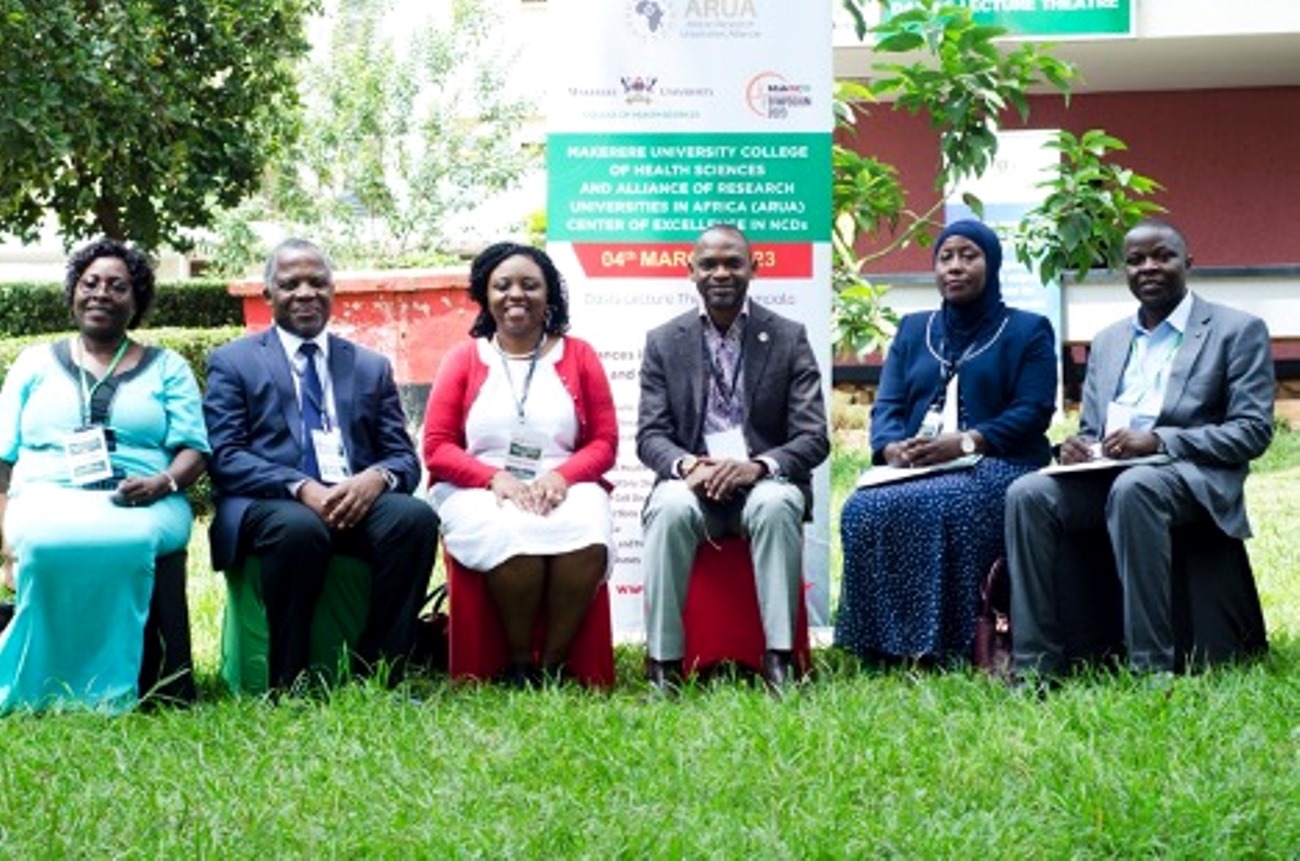
Stakeholders pledged to work together to address the growing burden of Non-Communicable Diseases (NCDs) in Uganda and beyond. The pledge was made at the NCDs Symposium held on Saturday 4th March 2023 and hosted by Makerere University College of Health Sciences (MakCHS), as a member of the Alliance of Research Universities in Africa (ARUA) NCD Centre of Excellence. The theme of the symposium was ‘Advances in NCD Training, Research and Community Impact’.
Research shows that, globally, non-communicable diseases (NCDs) are responsible for a significant proportion of deaths, with 41 million people dying from these chronic diseases each year. NCDs, also known as chronic diseases, tend to be of long duration and are the result of a combination of genetic, physiological, environmental and behavioural factors. The main types of NCD are cardiovascular diseases (such as heart attacks and stroke), cancers, chronic respiratory diseases (such as chronic obstructive pulmonary disease and asthma) and diabetes.
NCDs disproportionately affect people in low- and middle-income countries, where more than three-quarters of global NCD deaths (31.4 million) occur. In Uganda, the number of people living with NCDs has been increasing dramatically, making NCDs a major public health threat. For instance, 74,354 new cases of diabetes were seen at health facilities in Uganda in 2009-10 compared to 58,523 five years earlier showing an increase of 27% (HMIS data 2009/10). In 2013, the Uganda Diabetes Association revealed that over 200,000 children had diabetes and expressed fears the number could be higher because many of the children do not report to the hospital for diagnosis.
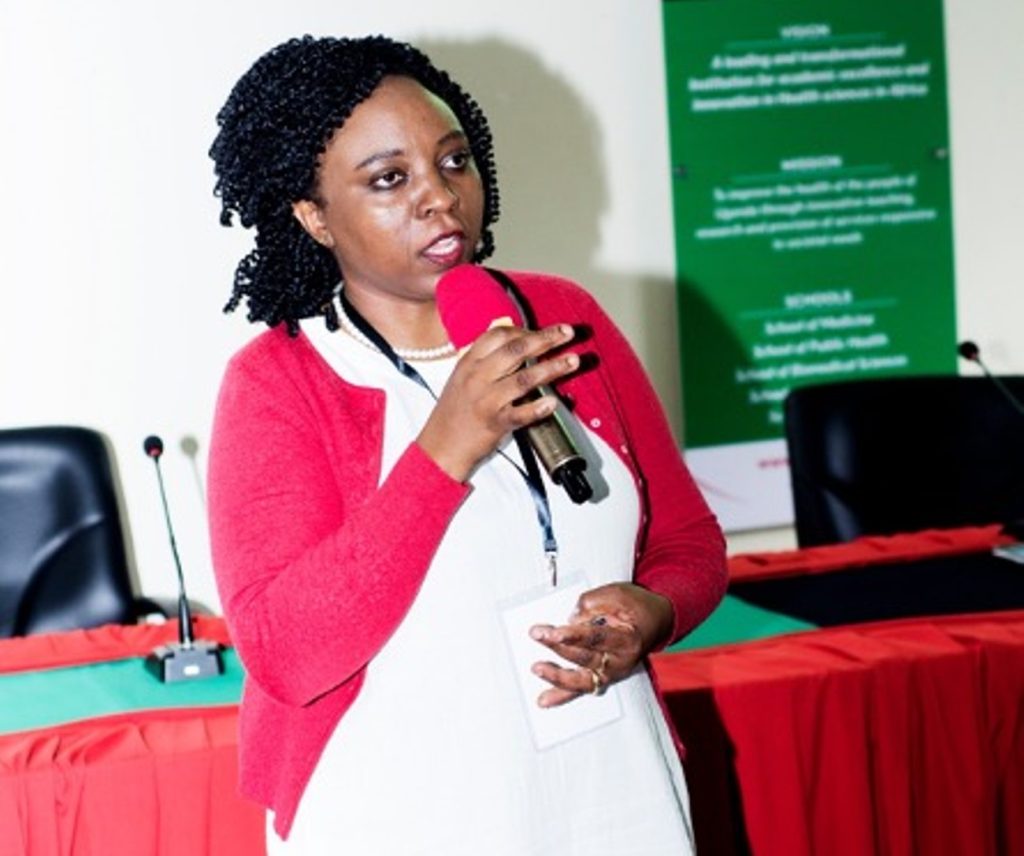
In her remarks as host, Professor Damalie Nakanjako, The Principal College of Health Sciences, Makerere University, in a special way welcomed participants to the Symposium and noted that the purpose of the event was to showcase the latest advances in NCD training, research, and community impact, and to provide a platform for stakeholders to engage and collaborate on issues related to NCDs.
Citing WHO data, Professor Nakanjako noted that NCDs represent the largest cause of mortality in adults with 86% of these premature deaths occurring in middle-income countries such as Uganda. She further pointed out that the incidence of NCDs among children, particularly diabetes, is increasing, indicating the urgent need for attention.
Professor Nakanjako stressed the importance of data-driven interventions, knowledge translation, and a multi-sectoral approach in addressing NCDs, and called for more investment in NCD research, collaborations, and regular exercise among children. She also reiterated Makerere University’s commitment to addressing NCDs through continuous advances in NCD training, research, and community engagement.
WHO Key Facts On Non-Communicable Diseases (NCDs)
- Non-communicable diseases (NCDs) kill 41 million people each year, equivalent to 74% of all deaths globally.
- Each year, 17 million people die from a NCD before age 70; 86% of these premature deaths occur in low- and middle-income countries.
- Of all NCD deaths, 77% are in low- and middle-income countries.
- Cardiovascular diseases account for most NCD deaths, or 17.9 million people annually, followed by cancers (9.3 million), chronic respiratory diseases (4.1 million), and diabetes (2.0 million including kidney disease deaths caused by diabetes).
- These four groups of diseases account for over 80% of all premature NCD deaths.
- Tobacco use, physical inactivity, the harmful use of alcohol and unhealthy diets all increase the risk of dying from an NCD.
- Detection, screening and treatment of NCDs, as well as palliative care, are key components of the response to NCDs.
During his speech, Dr. Fred Bukachi, the Director of ARUA Centre of Excellence for NCDs, highlighted the urgent need to address the rising prevalence of non-communicable diseases (NCDs) in the region and beyond through research, capacity building, and dissemination of findings. The Centre’s main objective is to develop scientific evidence for NCD policies, prevention, management, and control, while engaging with communities. To achieve this, Dr. Bukachi presented several strategies, including the creation of multi-disciplinary research programs, a training research and mobility program, an NCD research and data repository for Africa, and an annual international NCD symposium.
In addition, Dr. Bukachi emphasized the Centre’s commitment to improving the health and well-being of people in sub-Saharan Africa and beyond by addressing the NCD epidemic through research and capacity building. The audience responded positively to his presentation, with many impressed by the Centre’s ambitious goals and plans for tackling NCDs in Africa.
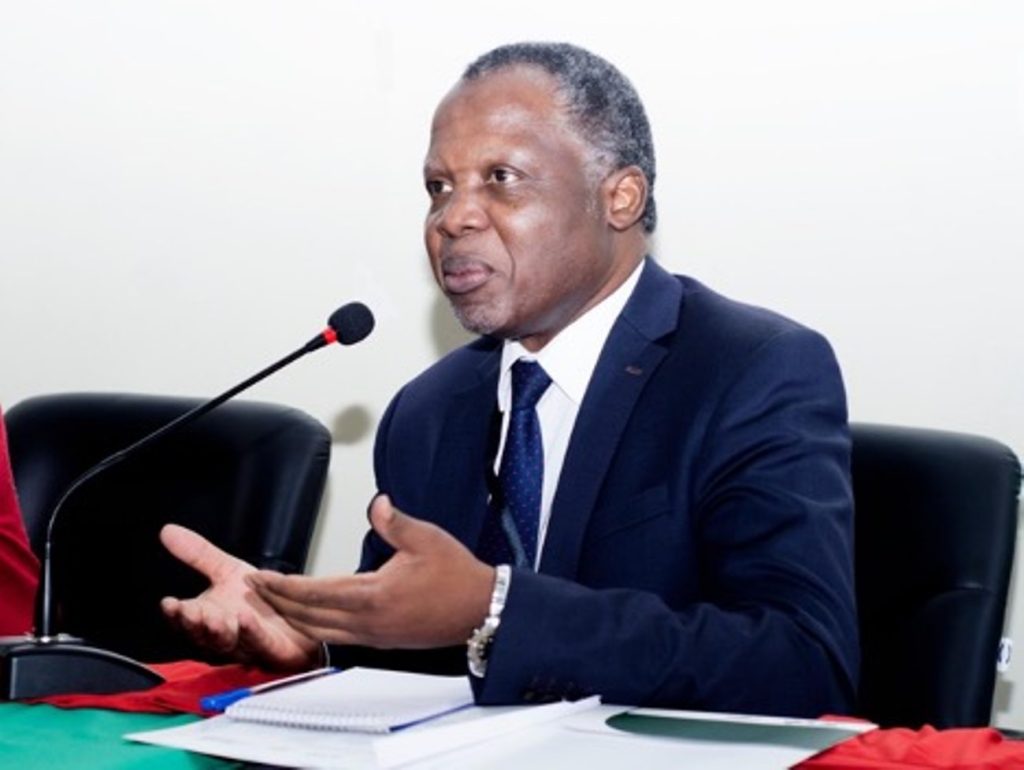
In his remarks, read by Dr. Frank Mugabe, Dr. Oyoo Charles Akiya, the Commissioner of Health Services-NCD Ministry of Health, stated that non-communicable diseases and injuries (NCDIs) are on the rise in Uganda. He revealed that the burden of NCDs has more than doubled in the last 20 years, with 22% of adults at risk of premature death (30-70 years) as of 2016. NCDs account for 41% of all deaths in the country.
Dr. Akiya cited the NCD risk factor survey and other studies, highlighting heavy alcohol consumption in men and women, consumption of unhealthy diets, tobacco use, physical inactivity, and obesity as some of the problems that need urgent attention. Data on high burden NCD conditions reveal that 24% of adults in Uganda suffer from hypertension requiring treatment, with only 24.3% accessing treatment. The prevalence of diabetes is estimated at 1.4%, and there is a high prevalence of sickle cell disease in the central, eastern, and northern parts of the country, with 1.3% of the population having the trait.
Mental health disorders, especially depression, are also prevalent, with over one million Ugandans experiencing depression.
On government efforts towards NCDS, Akiya revealed that Uganda is conducting the 2nd risk factor survey thanks to the World Health Organization and the School of Public Health.
Moving forward, Dr. Akiya proposed priority areas for research and training ; including the need to quantify the level of misinformation around diabetes treatment, implement preventive programs for known carrier communities of sickle cell disease, determine the cause and risk factors for increased cases of gastrointestinal cancer in Southwestern Uganda, understand the biomass gap and its correlation to chronic respiratory diseases, determine the gap in mental health service provision among general health workers, reduce the cost of kidney chronic disease transplant services, increase awareness of cardiovascular disease screening, and determine and document the cost of road traffic-associated injuries to the health sector and the country to halt these conditions.
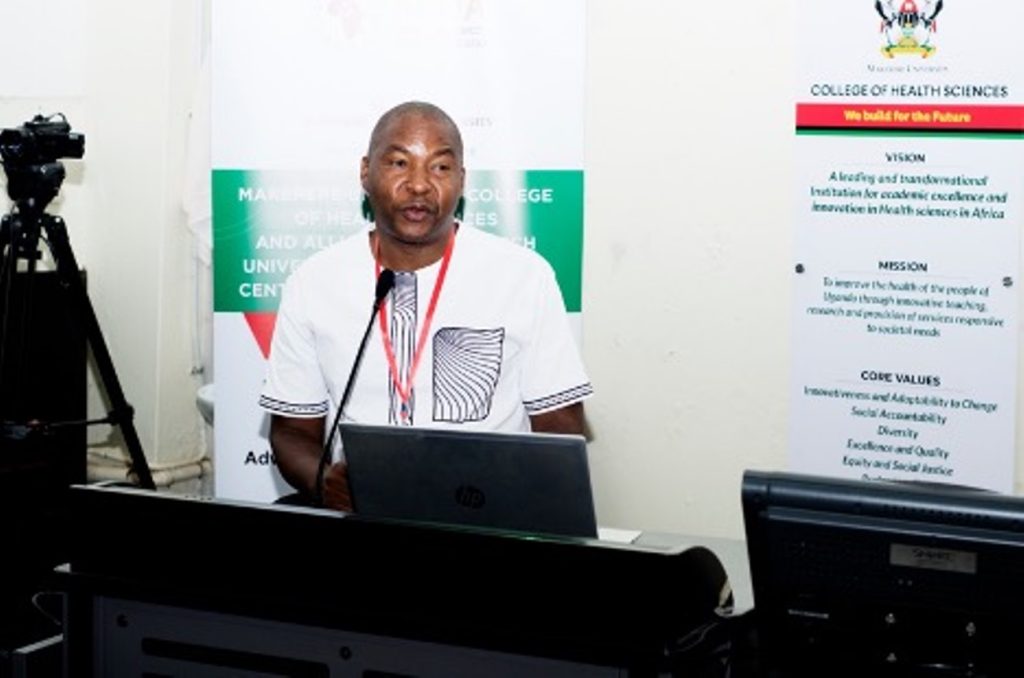
In his remarks as Chief Guest, Professor Umar Kakumba, on behalf of Makerere University’s Vice Chancellor Professor Barnabas Nawangwe, commended academia for their role in addressing emerging health threats, adding that Makerere University, as a research-led institution, is committed to supporting NCD activities through training, research, and community engagement. He emphasized that beyond training and research, there is a need to go to communities and share knowledge, as there is a gap in knowledge uptake around NCDs.
Professor Kakumba also highlighted the role of the private sector in supporting these causes, as a healthy population is key to their business success. He thanked Arua partners for taking the lead in addressing NCDs, which are responsible for 71% of global deaths and 85% of premature deaths in low and middle-income countries, including Uganda.
Moving forward, Professor Kakumba proposed a collaborative effort among stakeholders to address NCDs comprehensively. He emphasized the need for a holistic approach that involves the government, private sector, civil society organizations, and academia to address the growing burden of NCDs in Uganda.
He reiterated the commitment of Makerere University in supporting NCD activities through research, training, and community engagement, and he called on other institutions to join in this effort to achieve a healthier population and a more prosperous country.
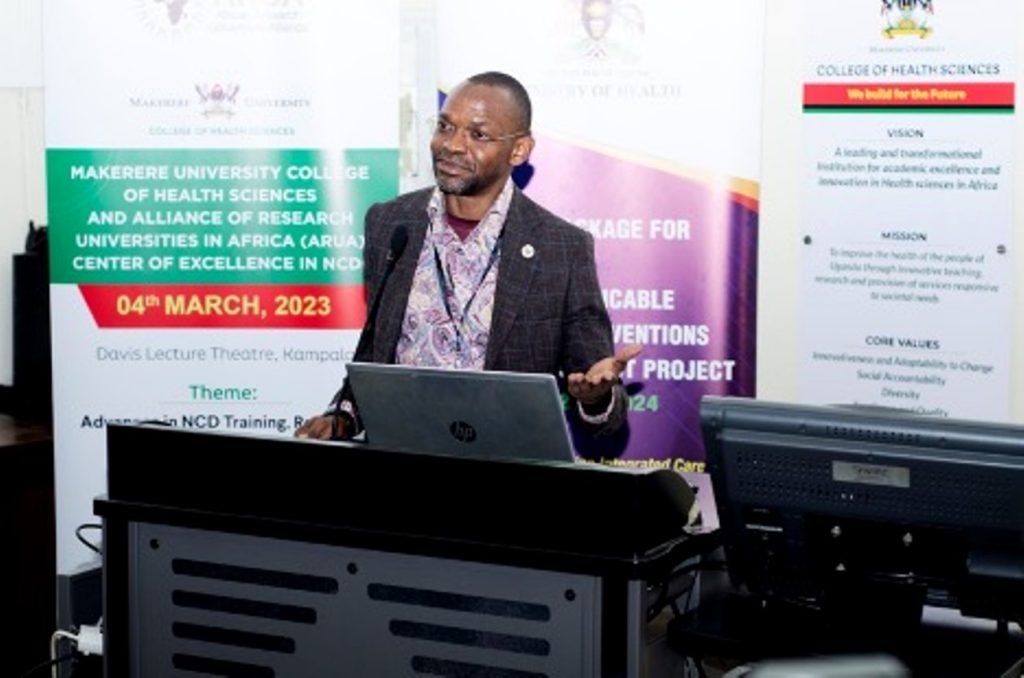
In her remarks, Dr. Kasule Hasifa discussed the priority areas for research and training in non-communicable diseases (NCDs) identified by the World Health Organization (WHO), including the need to prevent and control NCDs through public health interventions and policies, address the social determinants of NCDs such as poverty and education, improve healthcare accessibility and quality particularly in low- and middle-income countries, strengthen health systems to better respond to the growing burden of NCDs, and promote research on the causes, prevention, and treatment of NCDs.
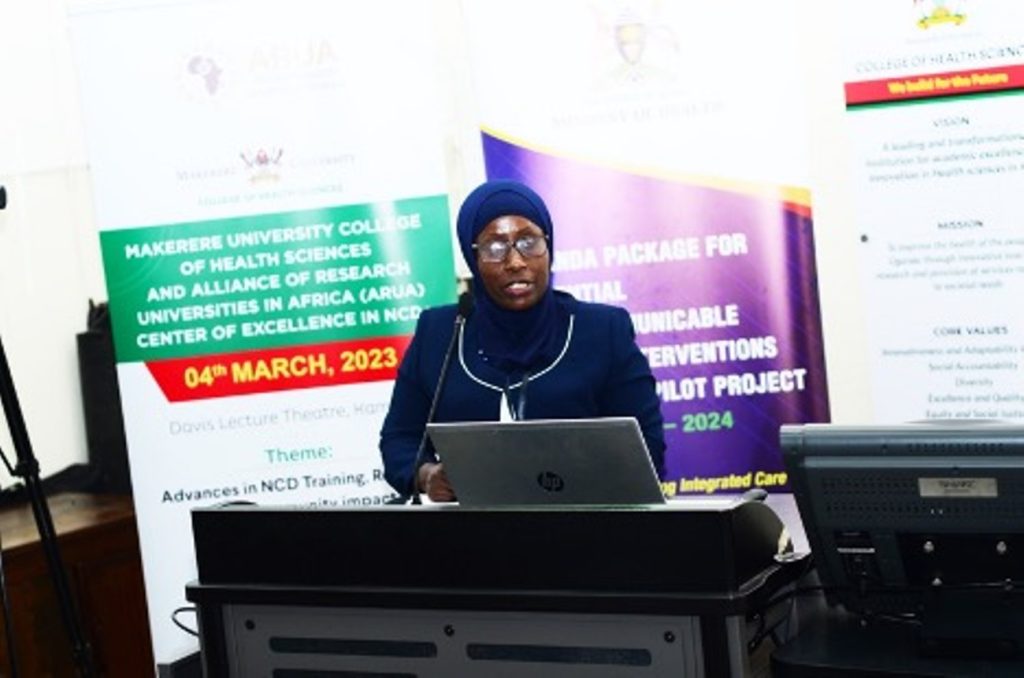
The event featured presentations from several NCD groups at MakCHS, including Cardiovascular Diseases, Renal Diseases, Diabetes Mellitus & Other Endocrine Disorders, Cancers, Mental Health Disorders, Respiratory Diseases and Lung Health, Sickle Cell Disease, and Other Haematological Conditions, as well as Interactions between NCDS and Infectious Diseases.
The symposium was attended by researchers, students, academicians, policymakers, practitioners, and health advocates with a special interest in NCDs. The day was crowned off with cake-cutting and all participants pledging to work together in addressing NCDs.
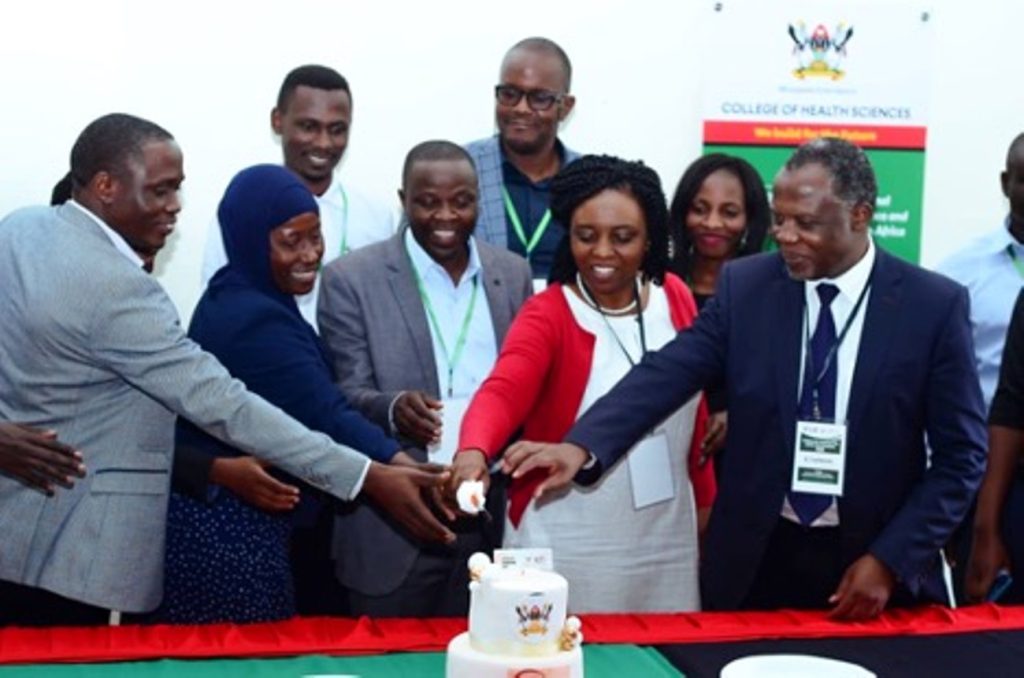
At the symposium, stakeholders agreed that it is crucial to work collaboratively to comprehensively address the growing burden of NCDs in Uganda. They recognized the need to implement preventive programs, increase awareness of cardiovascular disease screening, improve healthcare accessibility and quality, particularly in low- and middle-income countries, and promote research on the causes, prevention, and treatment of NCDs. It was emphasized that a holistic approach involving the government, private sector, civil society organizations, and academia is necessary to achieve a healthier population and a more prosperous country.
You may like
-
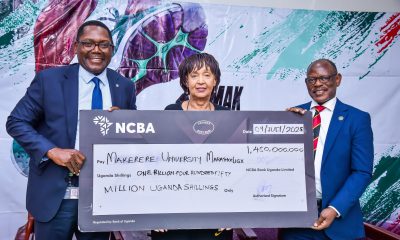

Mak Marathon Unveils NCBA as Platinum Sponsor
-
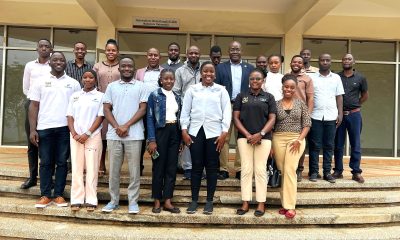

SophiA Project Upgrades Medical Infrastructure at Buvuma Health Centre IV, Trains Technicians for Maintenance Works
-


Re-advert: Admission to Undergraduate Programmes 2025/2026
-
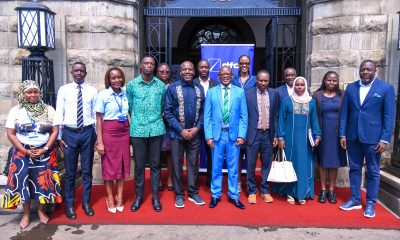

Makerere University, DFCU Bank Sign MoU to Advance Innovation, Student Leadership and Research
-


Press Release: Mak & DFCU Partner to Enhance Higher Education, Research & Student Support
-
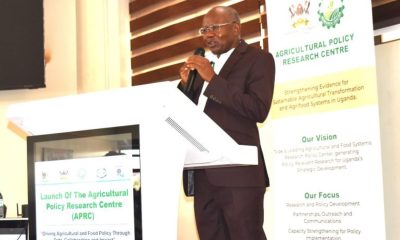

APRC Trains Graduate Students & Stakeholders in the Use of the African Agriculture Adaptation Atlas
Health
Call for Abstracts: Digital Health Africa 2025
Published
1 week agoon
July 2, 2025By
Mak Editor
The Digital Health Africa 2025 Conference will provide practical insights in the potential applications of digital technologies, using maternal and child health, as important examples. Topics of interest will include patient registries, safety signals, vaccine use in pregnancy/breastfeeding, labelling of vaccines in pregnancy, emerging infections and antibiotic resistance, telemedicine, pharmacometric modelling, precision medicine, medicines regulation, ethical and legal aspects, and capability enhancement.
Applying an integrated multi-site face-to-face and remote format, this hybrid Conference will use digital tools to allow delegates and speakers from three different regions, South Africa, Uganda and Germany, as well as fully virtual participants to engage with one another. This will offer a nexus for collaboration and networking to promote partnerships among local and international stakeholders as well as capacity building for young scientists. Delegates will have the opportunity to engage with experts from industry, academia, healthcare providers, government and regulatory agencies as well as patient representatives to learn from one another and to gain valuable insights into the latest trends and best practices in digital health.
Abstracts should fit into one of these categories:
- Maternal and Child Health (MCH) & Digital Innovation
- Infectious Diseases & Antimicrobial Resistance (AMR)
- Digital Health Systems & Scaling
- Governance, Data Management & Interoperability
- Artificial Intelligence in Health & Research
- Pharmacometrics & Digital Tools
- Case Studies & Lessons Learned
- Cross-cutting & Strategic Perspectives
Submission deadline: 31st July 2025.
Accepted abstracts will be presented as interactive posters:
- a physical poster presentation at one of the conference sites
- an e-poster (digital version of your physical poster for sharing online)
- a 3-minute recorded presentation to accompany the poster.
Presenters with accepted posters will be offered complementary conference registration.
Submit your poster abstract here: https://forms.gle/aXYHeZSwX2EhEUas5
Health
Emorimor Calls for Makerere to Upgrade Parenting Course
Published
2 weeks agoon
June 30, 2025By
Zaam Ssali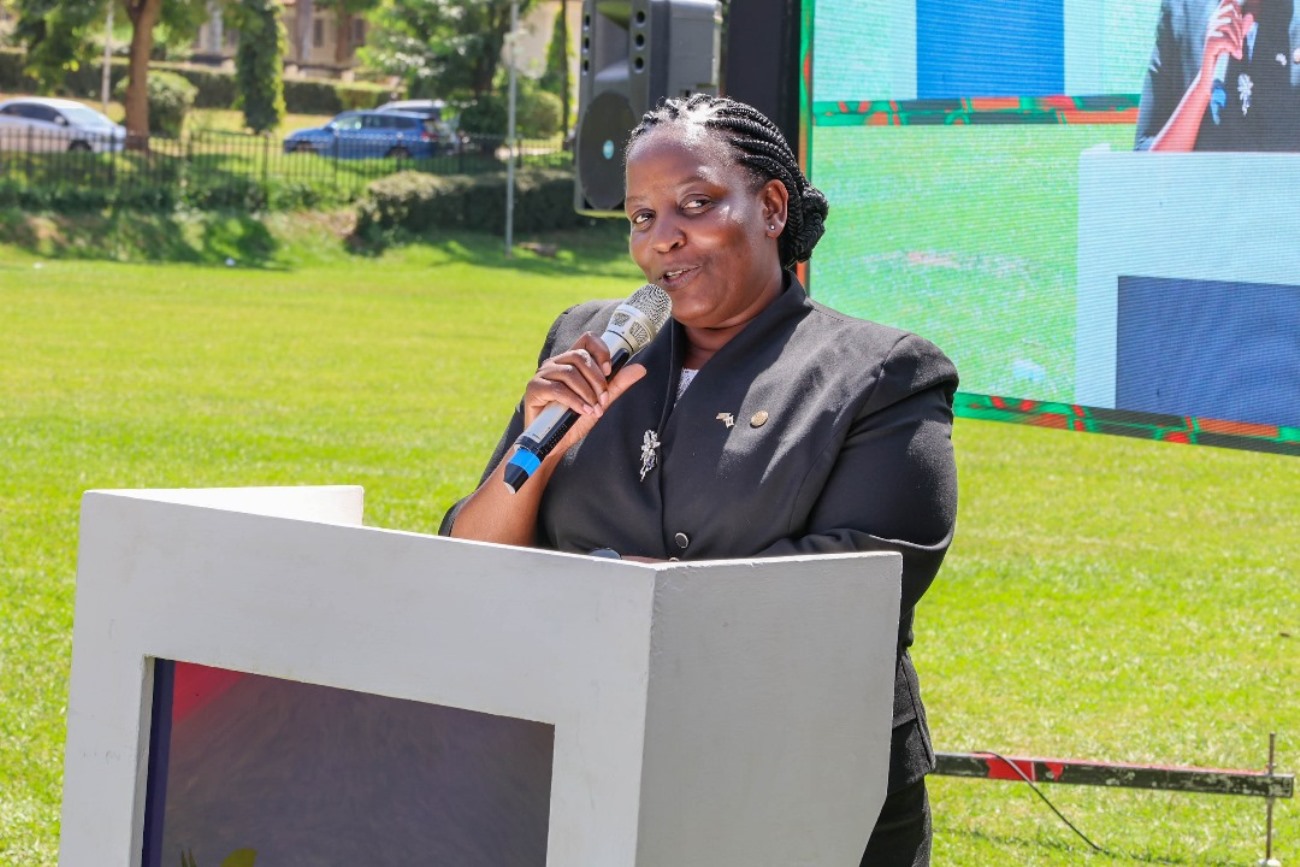
The Iteso Cultural Leader, His Highness Emorimor Papa Paul Sande Emolot, has called on Makerere University to elevate the Science of Designing, Adaptation, and Implementation of Evidence-Based Parenting Interventions course into a fully-fledged programme. This, he argued, would strengthen the capacity of practitioners implementing parenting interventions across Uganda.
Speaking at a graduation ceremony held on 11th June 2025 at Makerere University where 35 practitioners completed the 12-week course, Emorimor Papa Emolot emphasized the transformative power of effective parenting. He urged aspiring parents and advocates of the Parenting for Respectability model to enroll in the course.
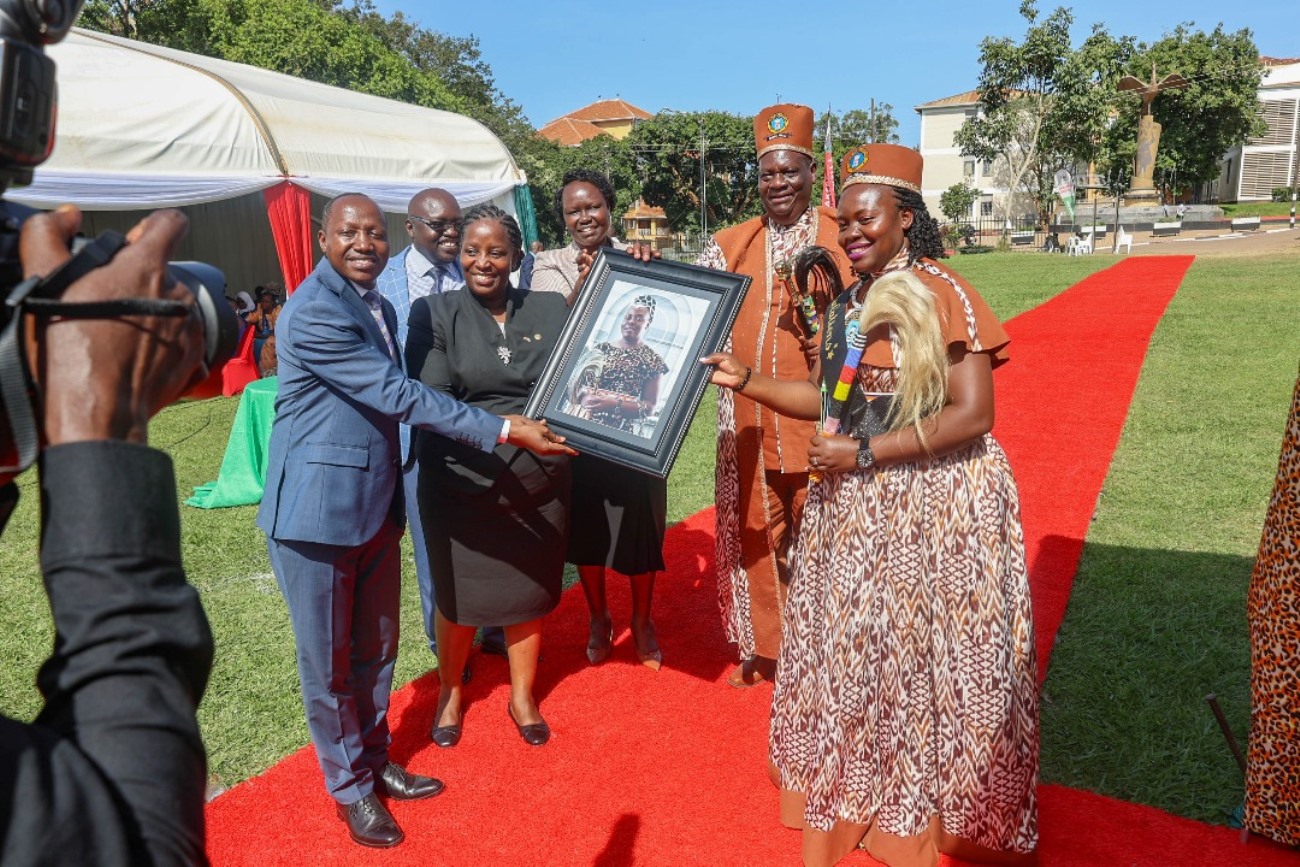
Citing the impact in his own sub-county and village, the cultural leader revealed that over 800 families had already benefited from the programme.
“We now see peace and love in homes where there was once conflict. Without good parenting, you risk raising animals instead of children,” he passionately stated.
He praised the course for equipping practitioners, policymakers, and researchers with the skills needed to design culturally sensitive, evidence-based parenting interventions tailored to Uganda’s context. Among the notable graduates was Her Royal Majesty Juliet Among Emolot Atomeileng Akaliat Toto, who reaffirmed her commitment to advancing family-strengthening initiatives using the skills and knowledge acquired.

Dr. Godfrey Siu, Senior Lecturer and Course Leader at Makerere University, described the course as a timely intervention. During this remarks, Dr. Siu described the event as a significant milestone in advancing the field of evidence based parenting intervention and family strengthening in Uganda.
“This course is meant to empower you as practitioners, policy makers and all those involved in development and implementation of parenting work. It provides both theoretical knowledge and practical tools essential for developing high quality interventions”, Dr. Siu noted. He urged the pioneer group to carry forward the expertise as champions of designing, adaptation and implementation of evidence parenting interventions.

Representing the Permanent Secretary of the Ministry of Gender, Labour and Social Development, Dr. Aggrey David Kibenge, Juliana Naumo, Commissioner for Culture and Family Affairs, said the course supports the government’s agenda to address negative social outcomes affecting families.
“By grounding parenting in research, harmonizing policy with practice, and advocating for equity, we will ensure no family is left behind,” she said. “Cross-sectoral collaboration is key to unlocking transformative change.”
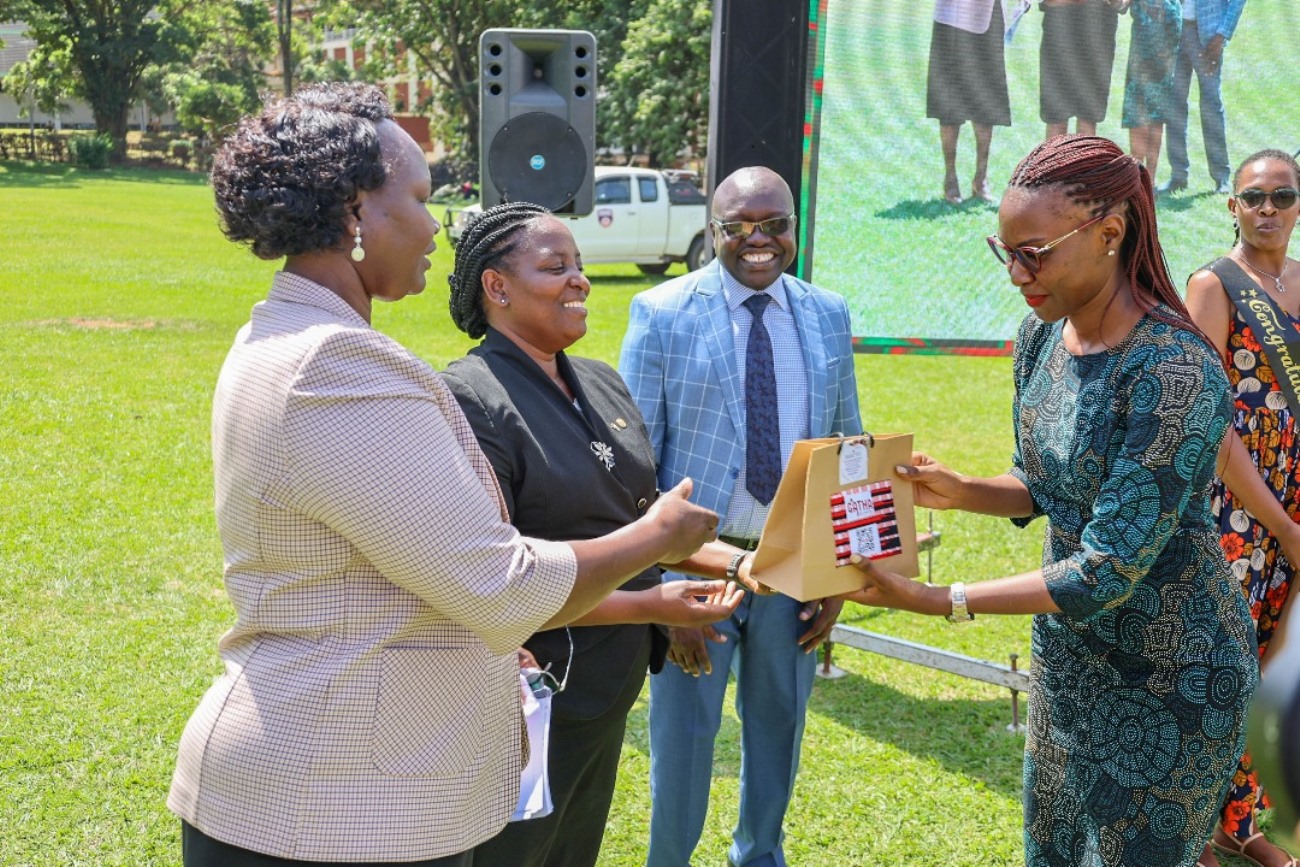
Ms. Naumo highlighted the government’s commitment—both technical and financial—to support outstanding student projects from the course. She stressed the importance of equipping professionals with the skills to bridge gaps between research and practice for consistent, high-quality parenting support across Uganda. While delivering the Vice chancellors speech by Dr. Helen Nambalirwa, Principal of the CHUSS, Prof. Barnabas Nawangwe commended the graduates as a beacon of hope.
“At a time when parenting faces challenges like digital distractions, changing societal norms, and a rising mental health crisis, Makerere reaffirms its support for interventions that drive the societal transformation we desire,” Nawangwe stated.
Prof. Richard Idro, Deputy Principal of the College of Health Sciences, acknowledged the growing parenting challenges in Uganda and the region, adding that the course was a major step towards standardizing parenting interventions nationwide.

He applauded the Child Health and Development Centre (CHDC) for leading this paramount and critical initiative.
Mr. Hosea Katende, Course Administrator at CHDC, emphasized the importance of integrating systematic methods, ethical principles, robust evidence, and collaboration to create lasting impact in parenting.
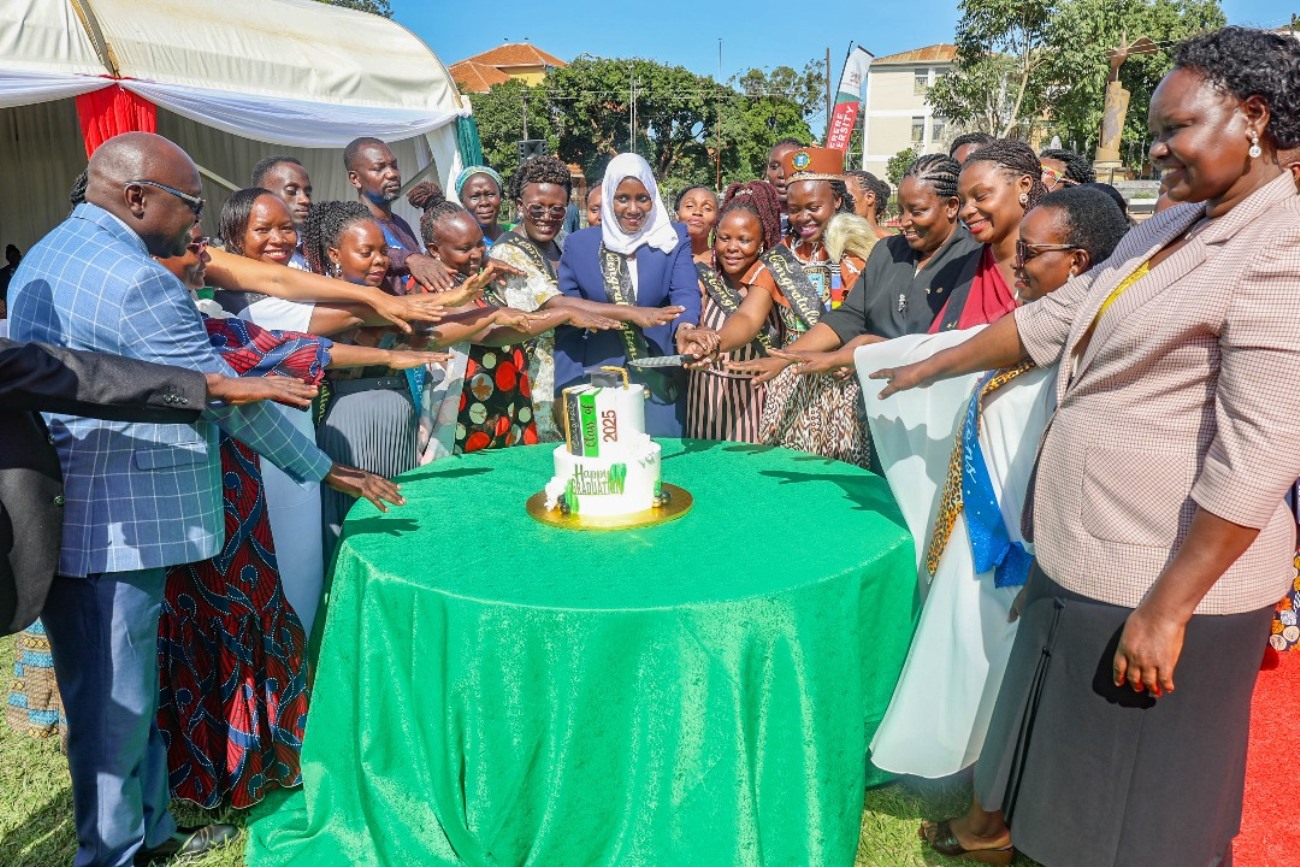
Dr. Aggrey Dhabangi, Lecturer at CHDC, representing Dr. Herbert Muyinda, Director of CHDC, acknowledged the contributions of partners such as the ELMA Foundation and Echidna Giving for their financial and capacity-building support. He also appreciated the Ministry of Gender, Labour and Social Development, among other stakeholders, for their technical guidance in the programme’s successful implementation.
Dr. Dhabangi extended gratitude to cultural institutions, especially the Kingdom of Teso, and acknowledged growing collaborations with other cultural institutions such as the Kingdom of Acholi, in the shared mission of building strong families as the foundation of Uganda’s future.

He extended his heartfelt gratitude to cultural institutions, especially the Kingdom of Teso, and others kingdoms such as the Kingdom of Acholi, in building Uganda’s future through creating strong families. Nuruh Mbalyowere, a Rehabilitation and Reintegration Officer with the Uganda Prisons Service, was honored for developing the best parenting intervention titled “Parenting Behind Prison Bars.” She expressed her intention to apply the knowledge gained both at home and in her workplace.
Health
MakSPH, DJC Launch Short Course on Health Communication
Published
3 weeks agoon
June 20, 2025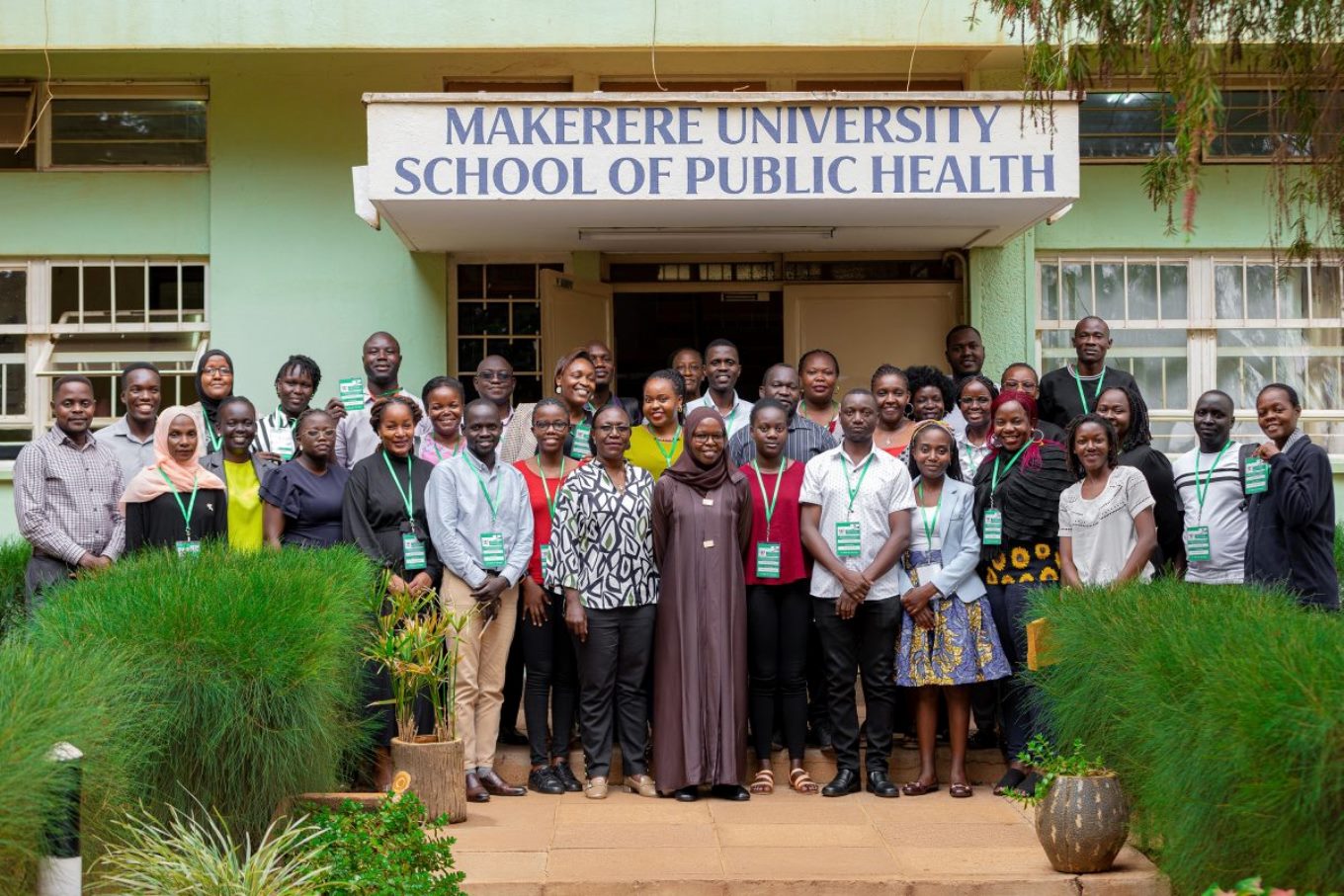
By Okeya John and Primrose Nabankema
The intensive one-month course, running for the first time from June 5 to July 24, 2025, is jointly offered by Makerere University School of Public Health (MakSPH)’s Department of Community Health and Behavioural Sciences (CHBS) and the Department of Journalism and Communication (DJC) at the School of Languages, Literature, and Communication (SLLC), co-designed in 2024 with support from the Rockefeller Foundation through Amref Health Africa.
It seeks to equip healthcare providers at the community level, public health and environmental health practitioners, communication specialists, health educators, community development officers, social scientists, and policy makers, among others, with strategic communication skills to improve public health messaging, strengthen community engagement, and support evidence-based interventions, ultimately empowering participants to effectively engage communities and improve population health outcomes across Uganda and the region.
Launching the course, the heads of the Department of Journalism and Communication and the Department of Community Health and Behavioural Sciences noted that participants who complete the short course will gain practical tools to influence behaviour change, build trust, and deliver timely, accurate, and relevant health information to the communities they serve. The first cohort attracted more than 60 applicants, with 36 reporting for the opening in-person session on June 5, 2025, at MakSPH in Mulago. Between now and July, participants will undergo a hands-on, multidisciplinary learning experience within the Certificate in Health Communication and Community Engagement program, which combines theory and practice.
Among the participants in the first cohort of the certificate course, designed as a pilot for the anticipated Master of Health Promotion and Communication to be jointly offered by the two departments at Makerere University, is Ms. Maureen Kisaakye, a medical laboratory technologist specialising in microbiology and antimicrobial resistance (AMR), and currently pursuing a Master’s in Immunology and Clinical Microbiology at Makerere. She is driven by a passion to help reverse the rising tide of AMR, a growing global health threat where drugs that once worked are no longer effective. Kisaakye is particularly concerned about common infections, like urinary tract infections, becoming increasingly resistant and harder to treat.
“I enrolled in this course because I’m an advocate against antimicrobial resistance, and it came at a time when I needed to deepen my knowledge on how to implement our projects more effectively and engage with communities. The experience has broadened my understanding of AMR and its impact on society, and strengthened my passion for community-driven health initiatives and advocacy,” Kisaakye said, explaining why she enrolled for the short course.

Kisaakye’s work in antimicrobial resistance extends beyond the lab. Having earned her degree in medical laboratory science from Mbarara University of Science and Technology, she founded Impala Tech Research in 2024 to drive impact and save lives. She has led grassroots AMR campaigns that integrate antimicrobial stewardship with water, sanitation, and hygiene (WASH) education in underserved urban communities, including the informal settlements in Kampala. She also has since designed peer-led initiatives that empower university students as AMR Champions, building a network of informed youth advocates. Kisaakye believes the health communication course will sharpen her ability to design and deliver impactful, community-centred interventions in response to the growing threat of drug resistance.
“The department collaborates with many partners within and beyond the University, including the School of Public Health, where we are working to develop the subfield of health communication and promotion. Our goal is to train specialists in this area and build a community of practice, something we have each been doing in our own spaces. There’s a lot of work ahead, and COVID-19 showed us just how urgently we need a generation trained to do this kind of work, and to do it very well,” said Dr. Aisha Nakiwala, Head of the Department of Journalism and Communication, during the opening of the short course on June 5.
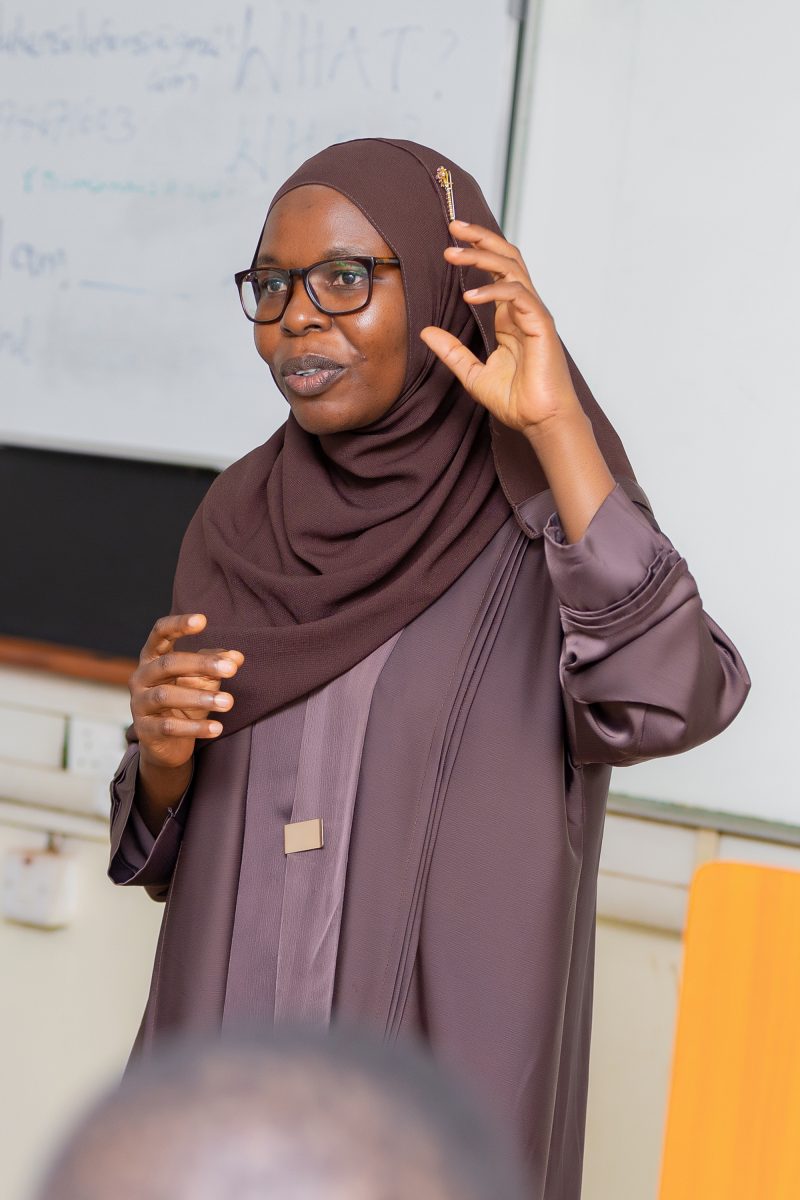
She assured participants they were in good hands and underscored the importance of the partnership between the Department of Journalism and Communication and the School of Public Health, describing it as a vital collaboration that brings together strategic communication and public health expertise. This dynamic, multidisciplinary approach, she noted, is essential to developing practical solutions that empower communities, strengthen health systems, and ultimately improve livelihoods.
The course offers a hands-on, multidisciplinary learning experience, with participants intended to explore key modules including Health Communication and Promotion, Risk Communication, Smart Advocacy, Community Mapping, Community Mobilisation and Empowerment, and Strategies for Community Engagement. The course combines theory with real-world application, and its assessment includes a field-based project and a final exam.
“You are our first cohort. We are seeing the fruits of our efforts in bringing this short course to life. It was born out of a joint initiative to develop a Master’s programme in Health Promotion and Communication,” said Dr. Christine Nalwadda, Head of the Department of Community Health and Behavioural Sciences. “We carried out extensive consultations with our different key stakeholders during the process and discovered a real need for such a course. It was the stakeholders who even named it; this course name didn’t come from us.”
For Kisaakye, by the end of the course in July, she hopes to have sharpened her skills in health promotion and strategic communication, particularly in crafting targeted messages that help individuals and communities effectively respond to threats such as antimicrobial resistance. She also aims to gain practical experience in designing, implementing, and evaluating community health initiatives that can strengthen her advocacy and drive lasting impact.
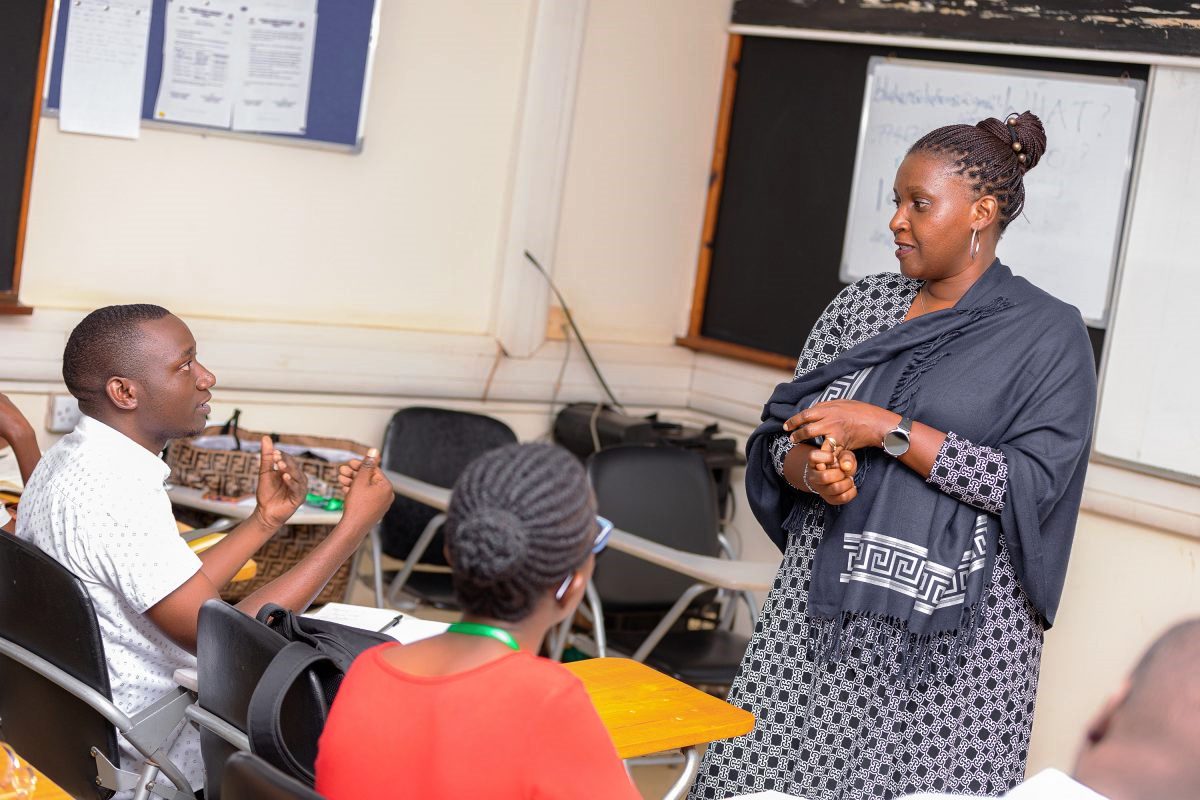
Trending
-

 Education7 days ago
Education7 days agoAdmission List to Bachelor of Education External (BED) 2025/26 -Private Sponsorship
-

 General1 week ago
General1 week agoUndergraduate Admission List Self Sponsorship Scheme 2025/2026
-

 General2 weeks ago
General2 weeks agoMature Age Scheme Exam Results for 2025/2026
-

 General3 days ago
General3 days agoRe-advert: Admission to Undergraduate Programmes 2025/2026
-

 General1 week ago
General1 week agoAdmission Lists for – Bachelor of Laws 2025-26
